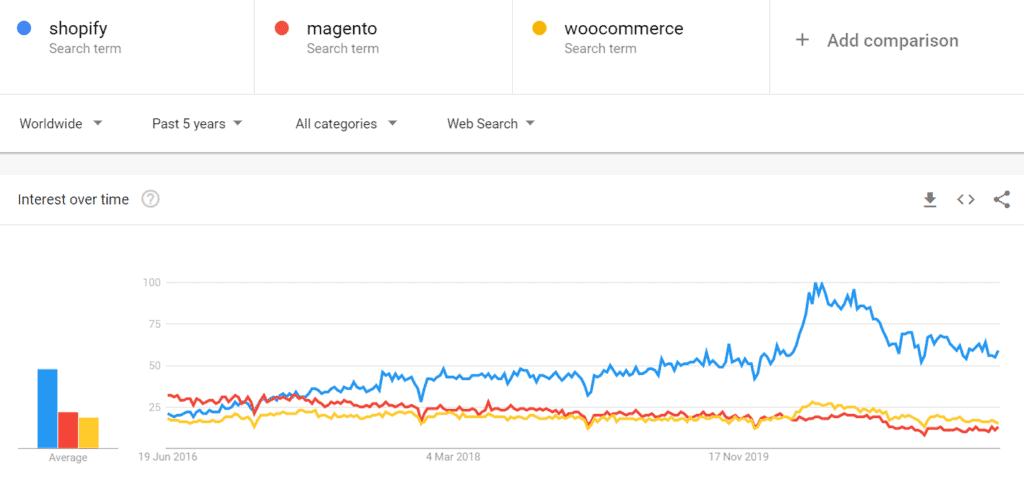Shopify is fast becoming a household name but a number of misconceptions still surround it.
Google Trends data (image below) shows just how more popular Shopify has become compared to the likes of competitors Magento and Woocommerce.

The platform has built a reputation on its ease-of-use and accessibility for businesses intent on expanding their e-commerce offering.
One of Shopify’s greatest strengths is its out-of-the-box nature, reducing the need for intensive development for many merchants.
They can rely on a checkout experience, for example, which has been continually optimised to eke out better conversion rates – but this does mean this particular area of a site cannot be customised, unless you are on a Shopify Plus package.
This approach has led to two of the most common misconceptions and criticisms: 1) that Shopify is only for businesses taking their first steps into e-commerce and 2) that the platform is restrictive.
On the first point, it is true to say that the standard Shopify plan is an ideal option for those looking to build their first stores – but another of the platform’s strengths is the capability to help brands scale.
From the standard plan, merchants can progress to Shopify Advanced and then to Shopify Plus, which comes complete with more customisation control, more stores and complex back-end automation which increases efficiency.
Shopify certainly isn’t a ‘baby platform’ – just ask Gymshark or Kylie Cosmetics or Hasbro or, even, the BBC, whose merchandise store sits on Plus.
When it comes to ‘being restrictive’, critics point to open-source competitors allowing for pretty much infinite customisation whereas Shopify simply does not.
The inference is that your Shopify store will look and feel similar to other Shopify stores, but that simply isn’t true.
“The theme engine within Shopify isn’t restrictive,” says James Davey, founder of e-commerce agency The Armoury. “It is as open as it can be and you can build any experience within it you wish.”
James was part of the panel for our very first video session with Shopify to discuss a range of topics in the world of e-commerce and retail, including:
- How the pandemic has forever changed our buying habits
- How this has led to the discovery of new brands
- Why the high street needs to make big changes to attract shoppers again
- Why new online tracking changes should signal the end of lazy marketers
- Shopify’s enhanced partnership with TikTok and the future of social commerce.
James was joined by Shimona Mehta, managing director for Shopify EMEA, Jaye Cowle and Danny Ireland, from paid media agency Launch Online, and Nathan Lomax, co-founder of Quickfire Digital.
Watch the video to learn why Shopify should be on your business’ shopping list.



